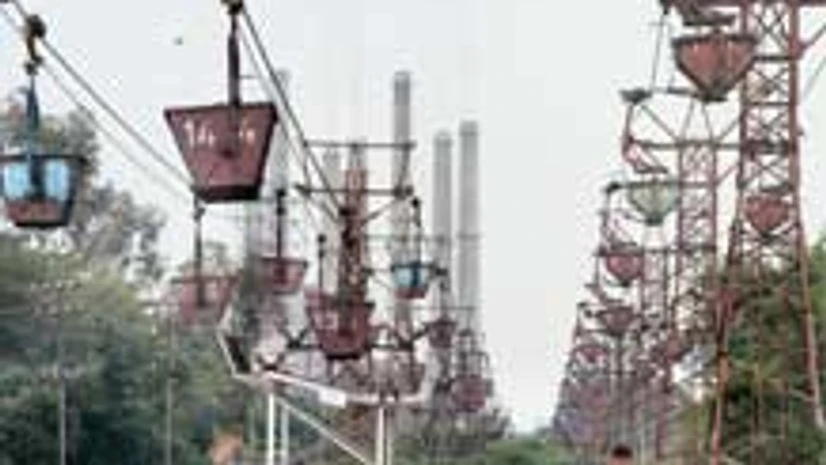The Cabinet Committee on Economic Affairs (CCEA) has recently allowed the pass-through of the cost of imported coal. A jubilant representative of the Association of Power Producers, an influential private power developers' club, announced, "We are very happy. Our two years of hard work has finally paid off." Given the lobbying it did. it was indeed a lot of "hard work" that yielded undue dividends to them at the cost of the public.
A few months ago, in defence of its subjective and heavily under-priced allotment of captive coal blocks to private developers, the government ingeniously argued that auctioning would escalate the coal price, which in turn would burden electricity consumers. Ostensibly, to safeguard consumers' interests, the ever-caring political executive chose to allot coal blocks non-transparently, benefiting its kith and kin more than the public.
When it came to pricing natural gas from the Krishna-Godavari basin, where the main producer is an influential private company, the government displayed its unique ingenuity once again, though in a different way. This time, it was a mythical increase in the world market price of natural gas, an elusive incentive to private developers to invest in inflated reserves of domestic gas and the need to keep an imaginary "import lobby" at bay. Though a steep increase in the gas price would hurt the interests of electricity consumers, despite all-round opposition, the government is rushing headlong into it, just to dole out huge largesse to the gas producer.
The latest decision on allowing a pass-through of the price of imported coal fits well into this overall paradigm of decision making - rational thinking yielding place to the exclusive objective of hurting the public to benefit private companies.
To appreciate this, one should look at the way the government had not only allotted coal blocks to private parties indiscriminately since 2004, but also cleared a mind-boggling number of private power projects to come up simultaneously, with their combined generation capacity exceeding three times that projected by the Planning Commission up to 2031. The power developers - many of whom are private companies with clout over the government - took part in competitive bidding; chose the fixed-price format consciously in preference to a variable price basis linked to fuel price changes. They already had subsisting contracts for importing coal up to 30 per cent of their needs. The Centre and the states gave them a slew of benefits like subsidised land, tax concessions and so on. The fixed-price format implied that they would neither pass on the benefit of a dip in the price of imported coal to the utilities, nor would they claim any incremental cost; a risk knowingly taken. However, the price of imported coal increased after the bids were finalised. In the normal course, if these power producers had failed to supply power at the contractual price, the contracts would have been scrapped at their cost and fresh bids called. Knowing the softness of the rulers and the regulators, they resorted to lobbying, which has ultimately paid off. The ethics of the tendering system have been given the go-by, the interests of electricity consumers sacrificed on the altar of crony capitalism.
The Union finance ministry has profoundly summed up the CCEA's decision thus, "The choice is paying a little more for electricity or having no electricity at all…." In reality, the choice was between enforcing contractual obligations on a few influential private parties, whose contribution to the overall electricity basket of the country is insignificant or allowing those companies to have their way, making a mockery of tender ethics.
It is ironic that such a decision should come at a time when the state electricity distribution companies are reeling under annual losses exceeding Rs 28,000 crore and when the power ministry has proposed to bail them out. The utilities, meanwhile, face a steep gas price increase on one side and inflationary pressures on the other, having no control whatsoever on either. As a result of the depreciation of the foreign exchange value of the rupee, an outcome that is attributable to macro-economic mismanagement in some measure, the impact of passing through the cost of imported coal would add to this, increasing the electricity price significantly, implying a larger relief package for utilities. The Union finance ministry, after all, juggles with the taxpayer's money; why should it bother?
The present coal shortage is clearly man-made, prompted by the government's deliberate steps to scuttle the capacity of Coal India Ltd (CIL), a public sector undertaking, and to divert good coal blocks from CIL to fly-by-night operators who failed to deliver. Instead of empowering CIL to tap its inherent potential and meet the genuine demand for coal, the government issued a Presidential directive to the state-owned coal producer to sign one-sided fuel supply agreements with the private power producers, overriding its commercial autonomy. Had CIL been allowed to function freely and professionally, the coal crisis would never have arisen.
The ways of the government are strange, to say the least. It first creates a problem; comes up with an ingenious solution, which in itself creates another problem. It reminds one of Charlie Chaplin's parody The Kid, in which Chaplin, who plays the tramp, and the kid go out together to "work". This involves the kid breaking windows with stones, after which Chaplin ambles by carrying a rack of glass panes ready to repair the damage for a fee.
The writer is a former Union power secretary
Disclaimer: These are personal views of the writer. They do not necessarily reflect the opinion of www.business-standard.com or the Business Standard newspaper

)
